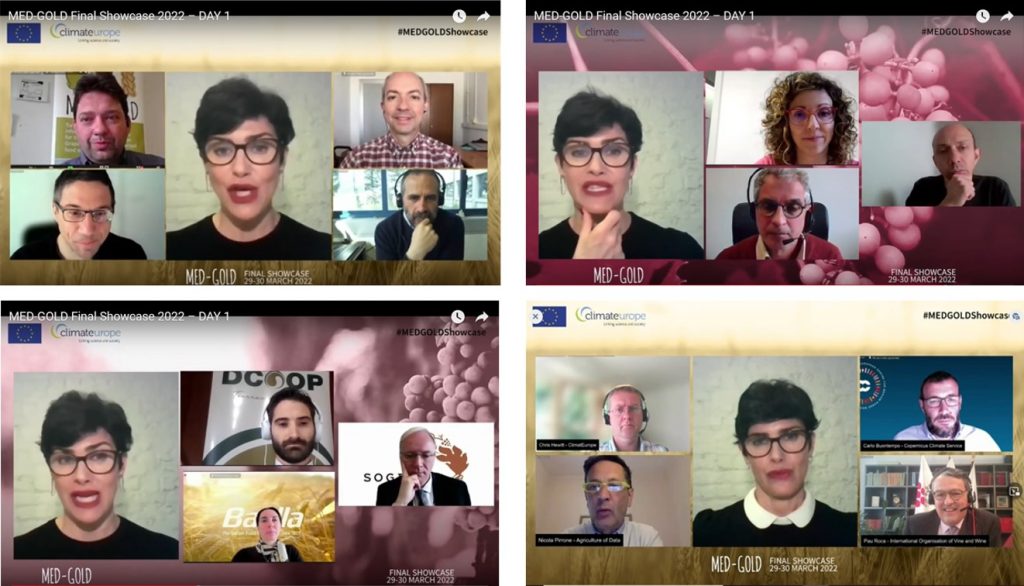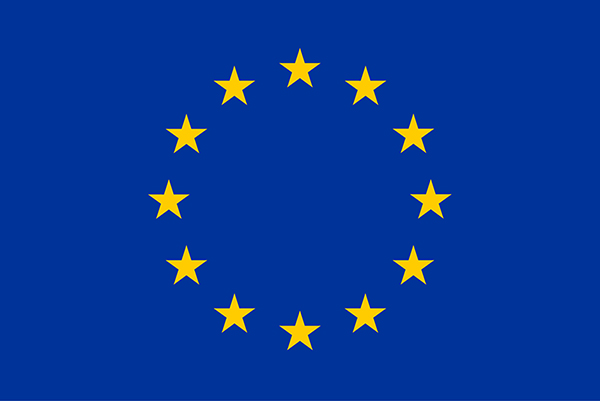The MED-GOLD project held its final showcase event online on 29-30 March 2022, with more than 200 participants. The attendees had the opportunity to learn about the climate services developed throughout this 4-year EU-funded project and how they can help the agriculture sector face the challenges posed by climate change.
The two-day event provided an insight into the lessons learned during the project. MED-GOLD users from the agriculture sector, representing the grapes, olives and durum wheat crops – the Portuguese wine company SOGRAPE, the Spanish cooperative Dcoop, and the Italian food company Barilla – presented their success stories as early adopters of the MED-GOLD climate services. The users also stressed the importance of a co-production approach in creating useful and usable tools for the agriculture sector.
Attendees also had the chance to engage in discussions with the presenters and other project participants, as well as to visit the virtual stands and view the posters, videos, and other materials produced by the MED-GOLD team.
“The founding idea of MED-GOLD was to create a new paradigm of climate-informed decision-making processes, with an approach based on coproduction and systematic engagement of users. This idea has played a key role in the implementation and assessment of the MED-GOLD climate services, which have been co-produced and tested with major industrial partners,” explained Alessandro Dell’Aquila, from the MED-GOLD coordination team at the Italian National Agency for New Technologies, Energy and Sustainable Economic Development (ENEA).
Users’ perspectives
The importance of finding common ground between scientists and users, as well as understanding users’ needs, was the underlying theme of the first session. Javier López, R&D technician at the cooperative Dcoop, shared his perspective as a user from the olive sector, and mentioned some applications of project results: “Climate-related information affecting, for example, the occurrence of pests and diseases, as well as providing advice on the application of fertilisers is valuable for our supply and service department”.
Antonio Graça, head of R&D at SOGRAPE, highlighted how being involved in MED-GOLD represented a fantastic opportunity to understand how climate affects the wine sector and specifically the taste of wine. Graça mentioned how important it is that the community of wine producers, “the people who work the land”, can make the right decisions allowing the grapevine to thrive and produce the best possible taste. “The climate services that we have developed provide seasonal forecasts that allow us to look into the future up to seven months in advance. This helps growers understand if the risk of pests and diseases would be high or if there is need for irrigation. By doing that, they become more efficient and resilient”, he said.
Long-term climate projections as well as seasonal predictions are useful for the durum wheat sector, as explained by Chiara Monotti, senior purchasing manager at Barilla Group. “Long-term projections allow us to be informed on changes in crop yield and suitable cultivation areas in the world in 20-40 years’ time. This is helpful not only to forecast the evolution of the crop globally but also for planning future policies and investments”.
Co-developing tailored climate information for decision making
Effective communication and knowledge exchange are essential to engage with stakeholders and build a trusting relationship. On this point, Marta Terrado, MED-GOLD partner and science communicator at the Barcelona Supercomputing Center (BSC), described the various types of communication materials developed in the project: “Materials like infosheets or user guides help explain concepts and deliver key messages to stakeholders, as they are written in a terminology adapted to their context. Multi-language versions of these materials have been created because offering information in the vernacular language of users needs to be considered as a part of delivering a climate service”.
The second session focused on the scientific and technical aspects of the co-development and delivery of climate services, as well as the assessment of their value for users. In this sense, co-developing tailored climate information is crucial for improving decision-making, as remarked by Nube González, climate scientist and leader of the climate services team at the BSC. González also highlighted that “climate data is not the same as climate information. If you want to make climate data actionable for decision-makers, it is important to involve them in the process of transforming this data to create a climate service, such as the MED-GOLD Dashboard”. In line with this comment, Christos Giannakopoulos, research director at the National Observatory of Athens, explained that ” usability goes well beyond availability”, and hence the importance of co-developing climate services.
The legacy of MED-GOLD
The second day of the MED-GOLD final showcase event focused on the project’s legacy and its relevance across sectors, policy and society at large, as well as its potential contribution to the UN Sustainable Development Goals. A number of panel discussions were organised with representatives from key organisations in the EU food systems (HORTA, Wine Consulting, Danesi Caffè, and Natural Business Intelligence), policy organisations (Food and Agriculture Organisation, International Olive Council, European Commission, and EU Centre for Development Policy Management), and European and international initiatives (Climateurope, Agriculture of Data, Copernicus Climate Change Service, and International Organisation of Vine and Wine).
Chris Hewitt, the former coordinator of the Climateurope project, underlined the difficulty of developing climate services that can meet decision-maker’s needs and add value. “It is a big challenge to develop valuable services, and it can be even harder for decision-makers to adopt them.” Thus, Hewitt stressed that “it is really important to engage across the entire landscape of the climate service value chain, not only individual parts.”
Pau Roca, Director General of the International Organisation of Vine and Wine (OIV), discussed the specificity of the wine sector. “It is difficult to make this transition [from research] to application, but I think that the wine sector is privileged. We have many different institutional levels and that helps a lot because they are very good at institutionalising the value chain. Everything is regulated in order to manage quality, and all this has to do with anticipating what is going to happen,” he said.
Regarding the challenges of climate change for the wine sector, Roca was optimistic and confident about the potential of climate services: “The vineyards are very adaptable to climate change, but this adaptation needs to be well informed. We have been producing wine for thousands of years and now we have all this information available. Climate services like the ones developed in the MED-GOLD project are a huge opportunity to multiply the performance of the sector”, concluded Roca.
The potential replicability of the MED-GOLD climate services for other crops beyond the Mediterranean grape, olive and durum wheat agri-food systems was also discussed during the event. Participants had the opportunity to learn from the experience acquired during the project with the coffee sector and from other initiatives where climate plays a fundamental role. The so-called ‘replicability corner’ allocated on the event’s platform hosted videos that shared the perspectives from representatives of the National Association of Coffee Exporters of Colombia, the Observatoire du Sahara et du Sahel, and the South African National Space Agency. Replicability becomes especially important as the project approaches its end on the 31st of May 2022.

From left to right, upper row: Moderator Kathrina Sichel with MED-GOLD coordinators (Alessandro Dell’Aquila, Luigi Ponti, Matteo de Felice and Sandro Calmanti from ENEA); Moderator with technical sector leaders (Nube González-Reviriego from BSC, Christos Giannakopoulos from NOA, and Andrea Toreti from EU-JRC). Lower row: Moderator with business sector leaders (Javier López from Dcoop, Chiara Monotti from Barilla, and Antonio Graça from SOGRAPE); Moderator with some invited panellists (Chris Hewitt from Climateurope, Carlo Buontempo from C3S, Nicola Pirrone from HEU Partnership Agriculture of Data, and Pau Roca from OIV)
Written by José L. Cánovas and Marta Terrado (Barcelona Supercomputing Center)

